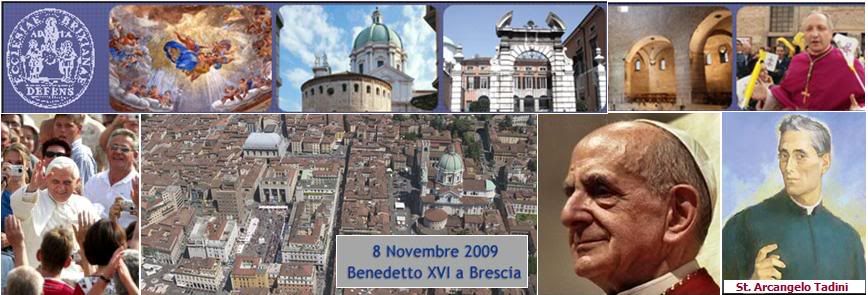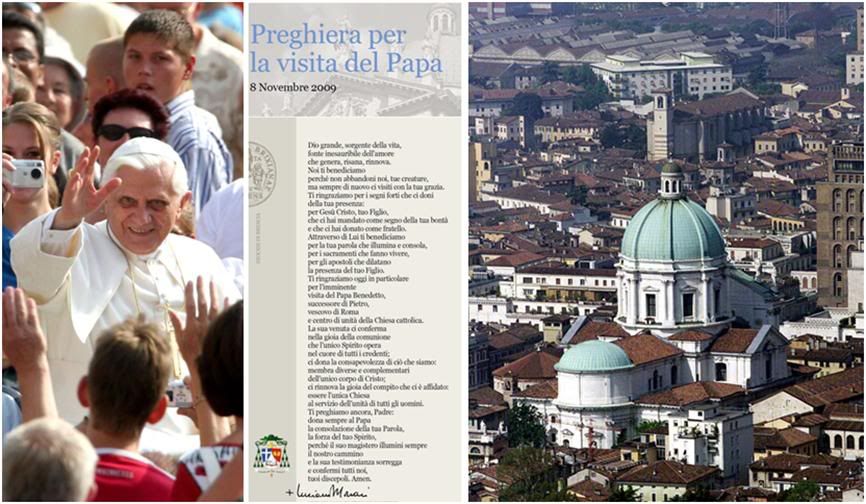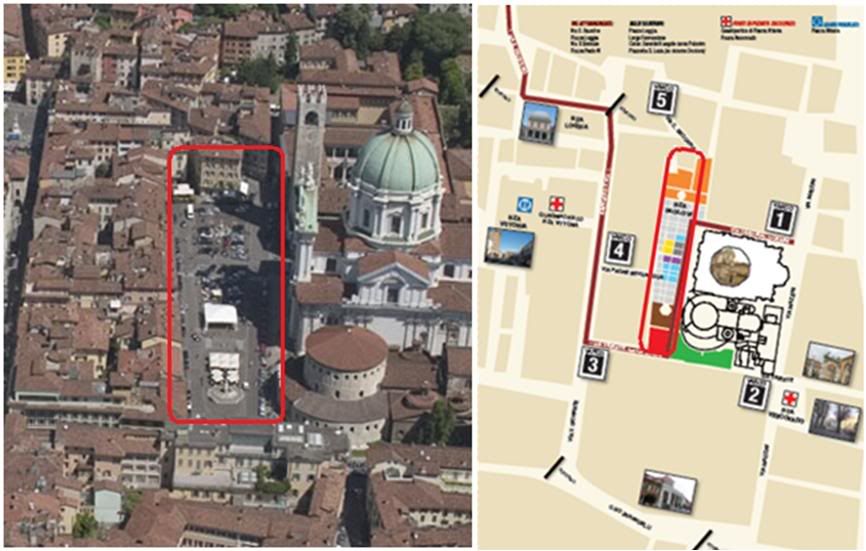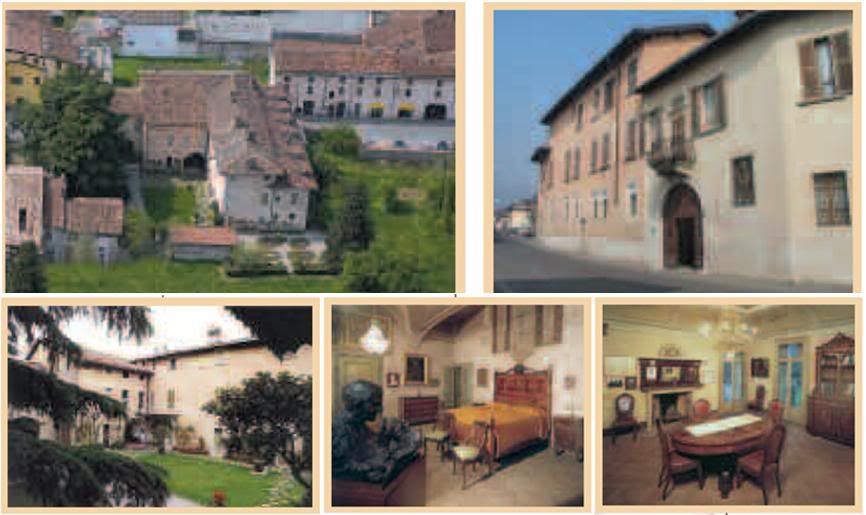

 Papa Ratzinger to pay homage
Papa Ratzinger to pay homage
to the Pope who named him cardinal
by ITALIA BRONTESI
Translated from

Nov. 1, 2009

BRESCIA - Pope Benedict XVI's visit to Brescia was originally intended to take place in late 2008, the 30th anniversary of the death of Pope Paul VI. But the papal schedule could not accommodate it till this year, and so the Bavarian Pope will be in Brescia on November 9, in the footsteps of the Pope who was born Giovanni Battista Montini in the suburb of Concesio.
The visit will be a total of ten hours from the time he arrives by helicopter at the military airbase of Ghedi at 9:30 a.m. till he returns to Rome.
His first stop from the airport will Be Botticina Sera, where he will venerate the remains of St. Arcangelo Tadini, who founded the Congregation of Worker Sisters in the early 20th century and was canonized last April by Benedict XVI himself.
A 10:15, he will arrive at the Cathedral of Brescia where he will celebrate Mass at the Piazza Paolo VI facing the church, which can accommodate 12,000. He will also lead the recital of the Angelus after the Mass.

He will then have lunch and a brief midday rest at the Centro Pastorale Paolo VI, before leaving in the afternoon for Concesio, Paul VI's birthplace. he will be travelling the 40 kilometers distance from the city in the Popemobile.
In Concesio, he will visit the home where Papa Montini was born and the church where he was baptized, then proceed to the Istituto Paolo VI where he will inaugurate the new headquarters - the immediate occasion for this visit.
The Institute is a center of study and research on the works and writings of Paul VI. The Pope will also preside at the awarding of the sixth Paul VI International Prize which is being awarded this year to Sources Chretiennes, the editorial series founded in 1942 by French theologians Henri de Lubac and Jean Danielou, which has been dedicated to the recovery of early Christian texts, especially those of the Fathers of the Church, and today comprises some 350 volumes.
 Photos show, clockwise from top left, aerial view of the Montini property; the street entrance to the home; the dining room; the bedroom where the future Pope was born; and the house seen from the inner courtyard.
Photos show, clockwise from top left, aerial view of the Montini property; the street entrance to the home; the dining room; the bedroom where the future Pope was born; and the house seen from the inner courtyard.
The Montini family home is located next to the modern complex of the Institute. Some rooms have been kept as they were at the time of the future Pope's birth, including the Empire-style bedroom in which his mother Giuditta delivered.
Cardinal Joseph Ratzinger was in Brescia in March 1986 when he gave a lecture on 'Theology and the Church' at a conference sponsored by
Communio, the international theological journal founded by a group of former Vatican II theologians including Hans Urs von Balthasar and Joseph Ratzinger. Twenty-three years later, he will be back as Pope.
"The significance of the visit is clear," said Mons Luciano Monari, Bishop of Brescia, at a news conference on Saturday, with the mayor of Brescia, Adriano Paroli, and the president of the province, Daniele Molgora.
"Thirty-one years have passed since the death of Paul VI. This visit is basically a homage to him, a remembrance of his pontificate, of the Second Vatican Council, and Benedict XVI's own links with the late Pope", who had named in March 1977 Joseph Ratzinger, then a university professor, to be Archbishop of Munich-Freising, and then less than two months later, made him a cardinal.

"The choice of theologian Ratzinger would seem to have been a strategic decision by Paul VI", said Mons. Monari, "
to have someone in the Church hierarchy who could represent the Council in a fully informed and balanced manner, a theologian who was known to be open-minded as well as well-rooted in the Christian tradition".
The Bishop also said that the visit serves "to highlight the
communion between the Church of Rome and the Brescian church, and to reflect together on the mission of the Church".
"The Magisterium of Benedict XVI," he continued, "is very much aware of modernity, to the life of man in the contemporary world, and in this perspective, holds up to our sight the fundamental values of the faith and of the Christian tradition, the values that man should have, and the collaboration between faith and reason. Whoever cares about human destiny needs to reflect on these."
When Cardinal Ratzinger
came to Brescia in 1986
by Fr. Antonio Maria Sicari, OCD
Translated from

I was the editor of the Italian edition of the international Catholic magazine
Communio from 1981 to 1990. To facilitate my work, the editorial headquarters was moved to Brescia, into the Catmelite convent of St. Peter in Castello.
It was at that time that we decided to invite Cardinal Joseph Ratzinger to Brescia, in order to give a public lecture that would relaunch the ideals of
Communio, so dear to him since the magazine was founded.
He was a guest at the convent, where we spent the morning hours together and had a festive lunch along with some lay faithful who had been invited. I remember that we were all pleasantly surprised by his simplicity and gracious courtesy.
And so, on the afternoon of March 22, 1986, more than 2,000 people were able to hear him at the beautiful Vanvitelliano Hall of the Palazzo Loggia, where he delivered a long and rather demanding lecture on "Theology and the Church".
To present him to the public, all I needed to do was to recall that he had written in his famous 'Introduction to Christianity': "The Church does not make its maximum presence felt where it is organizing, reforming itself, reacting and setting course; but it is best felt in those who believe in all simplicity, receiving the gift of faith which becomes the source of life for them."
I knew that the concept of 'believing in all simplicity' was particularly dear to him, because he had stated many times: "The Christian believer is a simple person - and bishops should safeguard the faith of these people from the power of the intellectuals".
Thus did the Cardinal himself perceive and live his difficult mission in Rome to "guard the doctrine of the faith and its practices throughout the Catholic world".
At that time, the bookstores did not yet offer all those 'investigations' and 'analyses' of Jesus Christ to which we have by now become weary of their 'all-knowing' presumptuousness.
In his Brescia lecture, the cardinal already warned: "Every discourse on Jesus which claims to be purely empirical (one could say 'purely historical') remains stuck in a decidedly absurd tangle of misunderstandings".
The concatenation of his thoughts followed each other with fascinating rhythm:
"A Church without theology becomes impoverished and blind; and a theology without a Church dissolves in arbitrariness".
"Since there is no theology without faith, there can be no theology without conversion."
"Theology becomes more possible, as faith itself becomes truly an experience."
"The connection between theology and holiness is supported by the testimony of history."
The cardinal's words descended calm and decisive on the congregation, as his lecture, in an increasingly persuasive manner, showed him to be a theologian enamored with Christ who could say with St. Paul, "I, but no longer I!"
He concluded his leacture with an image that was not without tenderness, commenting on an ancient Roman bas relief, in which a small but courageous white puppy (representing theology, or the true theologian) defends the Lamb from the attack of a lion ('pure reason, untrammelled and despotic').
More than 23 years have passed since then. And shortly, robed in white and with the name of Benedict XVI, he will return among us, to this city already so rich with memories of Paul VI, in order to give comfort once more to "the faith of the 'little folk' and the 'simple faithful'.
He is coming back to remind everyone this time, not just theologians, that the Christian is himself, and happily so, when "he does not pretend to make it on his own but allows himself to receive what he most needs".
The diocesan press office for the visit has made available the Cardinal's lecture - 10 pages of closely written typescript - on "Theology adn the Church", which I hope to be able to translate before Sunday, Unfortunately, no photos of the 1986 event have been made available.
[Modificato da TERESA BENEDETTA 04/11/2009 02:28]